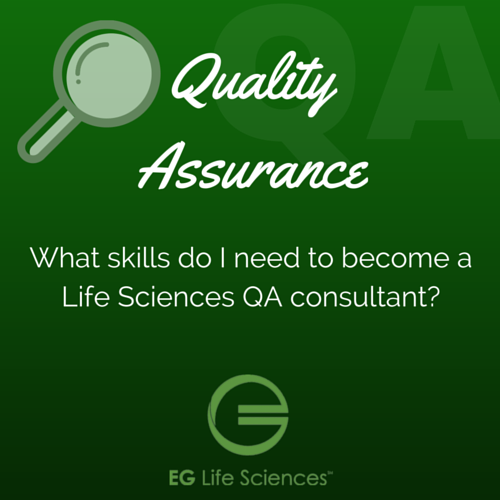Become a Life Sciences Quality Assurance Consultant
In Deloitte’s 2016 Global Life Sciences Sector Outlook, the research points to “an ever-evolving regulatory and risk environment” coupled with the “growing prevalence of chronic diseases” as just two of the factors driving the growth of the biotech sector and the heightened need for skilled Life Sciences professionals.
At EG Life Sciences, one specific area where we are seeing a great deal of demand for talent is in the realm of Quality Assurance and Quality Control. High quality standards must be the foundation upon which great biotech companies build their products and therapies and by establishing and executing efficient and cost effective QA/QC programs, these organizations can ensure that their products meet and exceed customer requirements.
To this end, there are various roles that are in high demand:
Quality Validation
Since consistent, repeatable results are the cornerstone of the Quality process, validation is a key role. The following positions fall into this category:
- Quality Assurance Validation Specialist
- Computer Systems Validation Engineer
- Cleaning Validation Engineer
- Validation Manager
While some of these roles focus more on the Quality Systems employed by biotech firms, others are closely tied to the manufacturing process. These positions typically involve the development of protocols, analysis and testing to ensure quality requirements are met.
Quality Assurance
Many times, those in quality validation roles will eventually move into Quality Assurance (QA) positions. QA professionals are responsible for conducting quality checks upon the validation work. The following roles fall into the QA realm:
- Quality Assurance Specialist
- Quality Programs Manager
- Regulatory Compliance Specialist
- Audit Control Specialist
In these positions, QA professionals ensure supplier/vendor compliance to regulations and quality requirements, conduct internal audits and are involved in regulatory audits and implement programs and measurements to ensure quality outcomes.
The Skills Involved in Quality Assurance Positions
Some of the skills that are required in Quality Assurance roles include the following:
- Reviewing and approving the commissioning of equipment – from computers to Building Management Systems
- Manufacturing plants and the quality validation process – ensuring that the water and air quality/flow meets certain specifications
- Computer systems validation work
- Development of SOPs for systems and supplier management
- Clean room management
- Interdepartmental communications to ensure that everyone understands the processes – a critical skill!
- Corrective and Preventative Actions (CAPA) skills – risk assessment, root cause assessment
- Deviation assessment
- Monitoring and tracking the status of internal remediation and audit work: resource requirements, remediate deficiencies
- Facilitating quality systems improvements/initiatives
Are you interested in a QA role in the pharmaceutical or medical device industries? We’d love to hear from you. Reach out to us at: info@eglifesciences.com.
